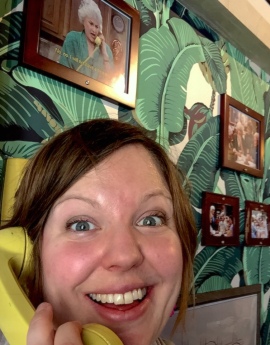Today is not the day the blood clot will travel to Marian’s heart. Today it will stay in her leg, a coagulated mess nestled in a deep vein. It does what it’s been doing for months: slows the flow of blood or staunches it, just for a moment, a flashing red.
Marian rises on the third alarm and says to Liam that she feels rushed by brushing her teeth in the kitchen while unloading the dishwasher.
Liam spends his mornings leisurely. He is up with the sun, but his office opens late. He reads the paper on the porch in his robe and house shoes. He makes himself waffles even though it is a weekday, offers to make her a waffle too. It would never occur to him to feel bad about indulgence. He drinks as much coffee as he wants. Sometimes he drinks green tea because he doesn’t even need the caffeine.
She leaves through the garage. He waves as she backs out, his green robe blending into the cushioned patio set, jungle flora.
Today is the day the auditors arrive. They will stay until they locate the source of the problem. They require a soundproof room with no windows.
“Our conference rooms all have windows,” she told the junior auditor over the phone.
“As long as there are blinds on the windows.”
She ordered blinds online with two-day delivery and justified the expense on company letterhead.
She drinks the break room coffee. It is the kind that comes in a plastic pod. Once, the other analyst, Janine, said, “Don’t you worry that drinking hot water that’s gone through plastic will give you cancer?” Janine spends five dollars a day at a coffee shop that makes flat whites just like they do in Australia. Janine went to Australia for a bachelorette party and came back calling it a hen party.
The auditors are late and younger than her. They call her Mrs. Pierce, even though she signed all her emails Marian. Did she mention her husband? It would have been unprofessional. She escorts them to Conference Room D and demonstrates how the blinds work. “It looks like you should pull this cord, but it’s actually this one.”
The auditors don’t even use the blinds. All morning, she watches them from her desk in the office she shares with Janine. There are two of them, and they open briefcases and spread paperwork over the table. There is a teleconference monitor mounted to the wall and they cover the webcam with a post-it note. They are hunting for her mistakes.
At half past eleven, Janine says it’s important to treat oneself and goes out for a second flat white. She does not ask if Marian wants anything. Marian prefers it that way. Asking about wants would only start the whole back-and-forth of buying one another coffees and scones and chocolates: items of unequal value. One of them would end up owing the other.
The junior auditor appears at her office door. “We’re ordering lunch.”
Marian rolls her chair back to face him. “I bring my lunch.”
“Great. Where can we tell them to drop it off? Front desk?”
“Oh. That’s fine.”
He disappears.
She stands for the first time in hours. Her torso is perched on two weighted balloons, swelled to bursting.
Tiny needles prick her toes. Asleep, they have fallen asleep. She shakes a foot and cries out, nearly falls.
But the intensity ebbs, a strange tide.
She is supposed to keep an eye on the auditors, but they are not going to do anything crazy. Her doctor says she should take real lunch breaks.
Traffic is bad. A blue car cuts her off, but she lets it go. Road rage is something she doesn’t tap into because who knows how much of it she has?
“You could walk,” Janine has said more than once. Janine moved to Austin from Chicago and insists on walking anywhere under a mile, even when it’s over a hundred, even when there is no sidewalk.
At Lady Bird Lake, there are benches facing the water. The first bench is covered in goose shit but the second is clean. A steady stream of heat-trained runners in sports bras and shorts run along the bike path. Marian’s leather flats constrict her feet. A bead of sweat starts at her neck and rolls down her spine, followed by another. Her waistband feels tight. The mayonnaise on her sandwich melts into its greasy parts.
She could stay on the bench, in the sun, looking at the lake or go sit in the car and finish her sandwich in the air conditioning. She wants to be the kind of person who appreciates nature, however rotten the fishy water smells, who doesn’t care what the auditors find. There will be a reconciliation.
Somewhere in this world, there are elephants. Somewhere, there is a person unafraid of hard things who is milling logs for a cabin she will build herself. There are streams that fork at fault lines, carve their trails in the rock, come back together, miles on.
Marian uncrosses her legs to air out the wet slicks on the backs of her knees. She could be one of those runners. She could get up early and exercise while Liam drinks his green tea on the porch, could sprawl out on the front lawn, asking for water because she deserves it. She could drive wherever because she already put in the miles, could eat two sandwiches, if she wanted.

Shayne Terry is a Midwestern transplant living and writing in Brooklyn, where she is a founding member of the Rumble Ponies Writing Collective. Her work has appeared in American Chordata, Wigleaf, Vol. 1 Brooklyn, and elsewhere, and has been nominated for a Pushcart Prize. Find her at shayneterry.com.


